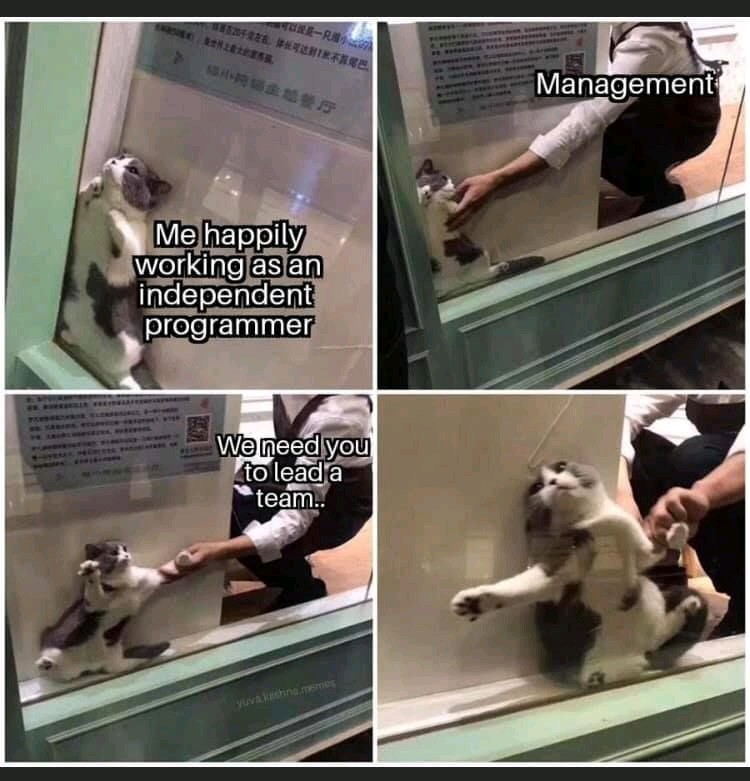
“Programmer turned manager…now what?” – IT zajednica Rijeka
Autor: Deborah Brakus Kršul

You are typing your code away and as a few years pass bit by bit you found yourself having more and more meetings and emails… One morning you wake up and ask yourself…when was the last time I did some actual coding? 🙂
We talked with our guest Filip Pravica who transitioned from being a full time developer to leading big teams with having barely any time to code Can we code and have time to lead a company/team…is it possible?
👨💻 HOST:
RENE BRAKUS partner in 46ELKS (https://46elks.com) a company that offers easy integration of SMS, MMS and VOICE services. It creates preconditions for sharing knowledge and strengthening connections within the IT community in Rijeka.
🧑🏻 GUEST:
Filip is a software engineer living in Amsterdam, Netherlands. To him, software development means more than just writing code… It’s about delivering business goals, not just software features!
As always, if you missed it, you can listen through the whole conversation on our YouTube channel:
Today we talked about a topic that is frequently an issue in IT companies and other companies where a person that is a highly capable software engineer finds himself “promoted” to a managerial position.
While it’s never a bad thing to get a promotion, this one requires an extra effort to transition to a managerial position and actually be good at it.
From Developer to Manager
You start out as a developer, and your job is to develop a new feature, to write a few tests and fix some bugs. You spend as little time as possible on office politics, presenting in boardrooms and creating reports. And if you love what you do, that’s probably a really great outcome.
The question arises of how you should progress in your career. Should you stay in a technical role? Or do you want to start venturing into “management”?
You might worry that you’ll end up in a position where you’re not doing what you enjoy on a day-to-day, but rather you’re doing exactly what you wanted to avoid by following a technical career path.
Most early-stage startups with just two or three guys or girls aren’t flush with cash. Every dollar they spend on an “expensive” manager is one less dollar they can spend on a direct contributor to the codebase.
Hiring the wrong manager can be incredibly damaging to the organization. Tech leaders in first-time leadership positions have it doubly bad — they also have to wrestle with the fact that they have never hired a manager before.
Many startup tech leaders put off the decision, falling back on what they know best: individual contribution or they assume the managerial role themselves.
The startup will eventually reach a point where there’s 6–8 engineers in a single team all working on the same product.
With a team this large, the founder is no longer in a position to directly manage these engineers, if they ever were in the first place.
The responsibility of ensuring the team still executes quickly falls to the senior developer.

WHY DEVELOPERS TAKE ON MANAGERIAL POSITION ?
At some point, every developer will have to make a decision: will they stay a developer, focusing on code, or will they move into a management level position, managing others.
First off, you have to figure out whether moving into management is right for you. A pay rise alone won’t be enough, because how long will that keep you motivated?
The question is whether you want to help build a strong team that will deliver for the company.
FILIP: There are various reasons why one would become a manager. Some people just want a bigger paycheck that comes with the position and others just want a promotion for which maybe they are not ready.
RENE: WHAT IS YOUR EXPERIENCE ?
FILIP: I started at the university more than 15 years ago in Croatia when startups weren’t a thing, we developed Infokiosk in a private company and very quickly I became the only software engineer. After graduation I started work full-time at a bank in Croatia and I could see how the hierarchy works and I learned a lot.
Large companies often want to prepare you for the position of a leader and invest in courses on communication with people, business correspondence and all the things needed to lead people.
ELON MUSK PERSONALLY INTERVIEWED THE CANDIDATES IN BERLIN
RENE: I know this story first hand that Elon Musk personally interviewed 20 candidates for a job that day in Tesla Gigafactory Berlin, and after he went to have a beer with a couple of them. I was thinking wow so obviously when it comes to priorities within Tesla Elon Musk has a priority to hire the right people.
FILIP: When I was working abroad I noticed that in the last stages of interviewes I would talk to the CEO because they wanted to know you and see your personality.
EXPERIENCE IS IMPORTANT
After 20 year in IT Filip knows what type of personalities fit in difrent position in a company.
When it come to interviewing people because of his experience he can see who has this attention to detail or recognize good salesman, who understands tehnology and what is best postion for them in the company.
How good of a manager someone will be depends on the person him self and how much effort will he put in to it.
HOW MANY PEOPLE CAN ONE PERSON MANAGE
RENE: I think I read it somewhere that one person can directly manage a maximum of seven people. You can successfully delegate tasks to seven people and that is like the maximum.
Having too many employees reporting directly to one supervisor is a recipe for failure on an engineering project. If any single person on a project (including you!) has ten or more direct reports, they have too many. They won’t be able to adequately track and guide this many people without losing touch with the important details of the work.
“Do not have too many men reporting directly to one man. As a rule, not more than six or seven men should report to one executive in an engineering organization. Occasionally a strong energetic leader will deal directly with fifteen or twenty engineers, in which case he is usurping the positions and functions of several group leaders, burdening himself with too much detail, and depriving the men of adequate supervision.” – W.J. King, The Unwritten Laws of Engineering, first published in 1944 by the American Society of Mechanical Engineers
WHAT FILIP DOES AS A MANAGER
Filip role is to manage between a development team and a business owner.
FILIP: If we have some difficulties with the project and there is a delay in delivery I need to explain this to the owner of the company and see what can be agreed for mutual benefit.
But you can only rally people behind any goal with passion and enthusiasm if you look after them and care for them personally first.
Working with actual people is very different. People have feelings, personalities, moods, motivations and goals of their own. There’s no undo – it can take a lot of time and work to take that thing back you said.
Another important responsibility of a manager is to build a high performing team.
46 ELKS TEAM IS COMING TO CROATIA ?
We will have a whole team from Sweden coming to Croatia in the spring of 2022 for team building.
IT community Rijeka will host them to share their knowledge and experience as much as possible in a week. We think it’s a good way for two different cultures to mesh.
MORE ABOUT FILIP ?
As a student, he started his career as a full-stack web developer. Initially, working on own projects and building an online service. Soon, he became a lead engineer at the local tech startup in Zagreb as an advisor to the CEO and he took responsibility for all software-related matters.
His next position was with UniCredit bank, where he progressed from Software Engineer to a Lead Software Specialist. He was responsible for the development of then-new Java Spring solutions and integration with high-performance IBM enterprise systems based on Cobol.
In 2011 he relocated to Scotland, Edinburgh, where he joined a mobile gaming company with headquarters in London. It was his introduction to agile software development and building games full-stack. At about the same time, he became a remote Technical Project Reviewer for the European Commission. There he was able to fulfil his interest in project management and software development coordination.
In mid-2012, his desire to work in FinTech domain resulted in joining a top global financial services provider – FIS. Soon afterwards, he accepted an offer to become a Dutch FIS employee and relocate to Amsterdam. His contribution as a Lead Technical Analyst was mostly in developing and integrating middleware services layer for core banking with a focus on security, performance and high availability.
Since living in Amsterdam, he also worked for renowned business innovation agency INFO, a top 5 Dutch full-service digital agencies by Emerce. His career continued in ING Bank, an online pioneer and leader in the digital future of banking.
In 2019 he quit his job and went on his own as a freelance consultant, mentor and tech lead for startups and SMEs in Amsterdam.
His interests are in technology consulting, software development management, solution architecture, systems integration and effective communication between business and delivery teams.
🔗 IT ZAJEDNICA RIJEKA:
📲 +385996768133


